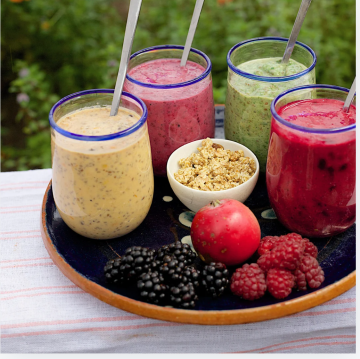
As we age, maintaining energy and supporting mental health becomes increasingly important. Nutrition plays a key role in ensuring that older adults can stay active, alert, and vibrant. At Hope Senior Home Care, we believe that a balanced, nutrient-rich diet is one of the best ways to support healthy aging, and we see firsthand how small dietary changes can make a big impact. Whether you’re aging in place or caring for a loved one, the right foods can enhance both physical vitality and cognitive wellness.
Here are some foods that help boost energy and support mental health in seniors:
1. Leafy Greens for Brain Power
Vegetables like spinach, kale, and Swiss chard are packed with nutrients that promote brain health. They are high in vitamins like K, folate, and beta carotene, which have been linked to slower cognitive decline. Adding a serving of leafy greens to meals a few times a week can help keep the mind sharp.
Tip: Incorporate leafy greens into smoothies, salads, or stir-fries to make them more palatable and easier to digest for aging adults.
2. Fatty Fish for Mental Clarity
Fatty fish, such as salmon, mackerel, and sardines, are rich in omega-3 fatty acids, which are essential for brain function. Omega-3s help reduce inflammation and have been shown to lower the risk of cognitive decline and dementia. Consuming fish twice a week is recommended for optimal brain health.
Tip: If fresh fish isn’t always an option, consider using canned varieties like sardines or salmon, which are easy to prepare and just as nutritious.
3. Whole Grains for Steady Energy
Whole grains such as oats, brown rice, and quinoa are excellent sources of complex carbohydrates, providing a steady release of energy throughout the day. They help prevent energy crashes and keep blood sugar levels stable, which is essential for both physical and mental performance.
Tip: Swap out refined grains like white bread and pasta for whole grain alternatives to ensure seniors get sustained energy without the blood sugar spikes.
4. Berries for Antioxidant Power
Blueberries, strawberries, and raspberries are not only delicious but also high in antioxidants. These compounds help fight oxidative stress, which can damage cells and accelerate the aging process, particularly in the brain. Studies have shown that consuming berries can improve memory and delay cognitive aging.
Tip: Fresh or frozen, berries are easy to add to oatmeal, yogurt, or even as a snack on their own.
5. Nuts and Seeds for Brain-Boosting Fats
Almonds, walnuts, flaxseeds, and chia seeds are packed with healthy fats, protein, and fiber. These nutrient-dense foods are excellent for boosting energy and supporting cognitive function. Walnuts, in particular, have been linked to better brain health due to their high concentration of DHA, a type of omega-3 fatty acid.
Tip: Keep small portions of mixed nuts and seeds on hand for quick, healthy snacks. These can be sprinkled on top of salads or yogurt for an extra nutritional punch.
6. Water for Hydration and Focus
Dehydration is a common issue among seniors and can lead to fatigue and mental fogginess. Drinking enough water throughout the day is essential for maintaining energy levels and staying mentally sharp. The body’s ability to sense thirst diminishes with age, so it’s important to encourage regular hydration.
Tip: Aim for at least eight glasses of water a day, and supplement with herbal teas or water-rich foods like cucumbers and watermelon to keep seniors hydrated.
7. Avocados for Healthy Fats and Brain Function
Avocados are rich in monounsaturated fats, which support healthy blood flow and help reduce the risk of heart disease. Improved circulation means more oxygen and nutrients are delivered to the brain, supporting cognitive function. Avocados are also high in potassium, which helps manage blood pressure—an important factor in overall brain health.
Tip: Use avocado as a spread on whole-grain toast or blend it into smoothies for a creamy, nutrient-packed boost.
8. Lean Proteins for Sustained Energy
Chicken, turkey, eggs, and legumes are excellent sources of lean protein, which is essential for maintaining muscle mass and energy levels in older adults. Protein also helps stabilize blood sugar, preventing the energy dips that can occur after meals.
Tip: Include a source of lean protein with every meal, whether it’s a serving of chicken, eggs for breakfast, or beans in soups and salads.
Practical Tips for Incorporating These Foods into a Senior’s Diet
Incorporating these nutrient-rich foods into a senior’s diet doesn’t have to be difficult. Here are some practical tips for making healthy eating easier:
- Meal Prep: Prepare meals and snacks in advance so they are easy to grab and eat throughout the week.
- Smaller, More Frequent Meals: Eating smaller, nutrient-dense meals throughout the day can help avoid large energy fluctuations.
- Taste and Texture: Adjust the taste and texture of foods to match preferences. Smoothies, soups, and soft-cooked vegetables are often easier for seniors to consume and digest.
- Supplements: If certain foods are difficult to consume regularly, supplements like omega-3s or a multivitamin may help fill in any gaps.
At Hope Senior Home Care, we understand that good nutrition is a cornerstone of healthy aging. By including these energy-boosting, brain-healthy foods in your diet, you can help ensure both physical vitality and mental clarity. Whether you’re caring for yourself or a loved one, making small, intentional changes to nutrition can have a big impact on overall well-being.
If you or a loved one need assistance with meal planning, preparation, or in-home care, contact Hope Senior Home Care today. We’re here to support you in your journey to age healthily and happily.

